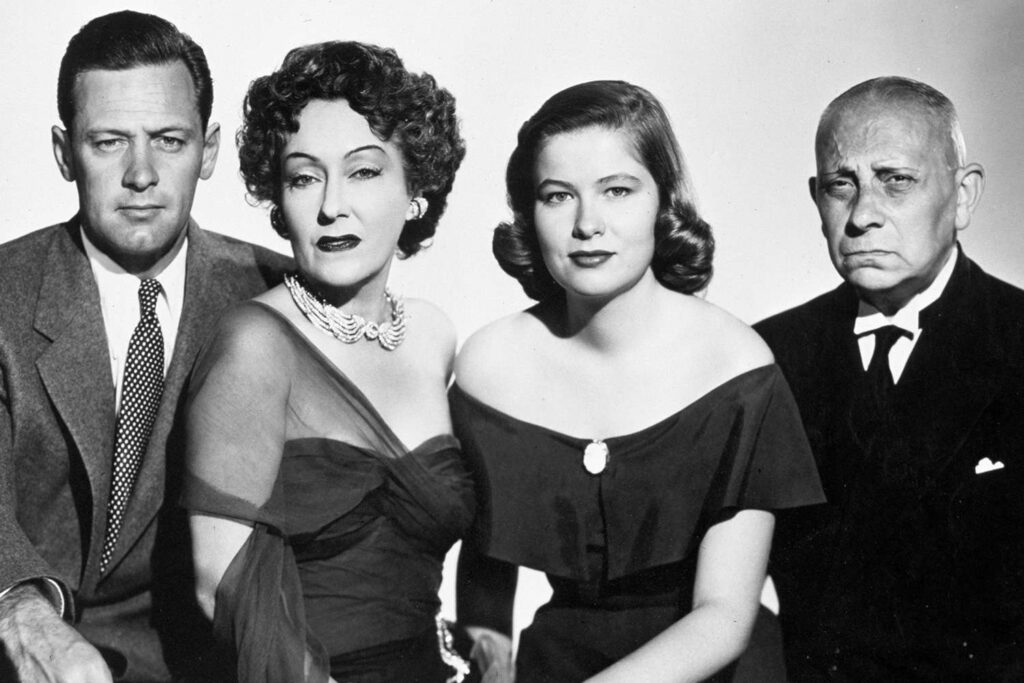NEED TO KNOW
As the last surviving principal cast member of the enduring 1950 film noir Sunset Boulevard, Hollywood’s most scathing indictment of how the industry discards people when they’re no longer useful, actress Nancy Olson had a true “close-up” view of the personalities behind the classic film. And as Sunset Boulevard marks its 75th anniversary on Aug. 10, the players remain larger than life in her memories.
Olson, then 21, was a student with only a handful of acting credits when she was cast by the film’s director and co-writer, Billy Wilder, to play Betty Schaefer, the eager studio production assistant and aspiring writer who offer the washed-up screenwriter Joe Gillis (William Holden) possible on-ramp back into the industry and out of the clutches of his older movie star benefactor Norma Desmond (Gloria Swanson), whose delusions of reclaimed grandeur threaten to consume them both.
But as Olson, still glamorous and sharp-witted at 97, tells PEOPLE exclusively, she soon realized that Wilder, who was looking for a comeback vehicle after a string a disappointing films following his triumphant hit and defining noir Double Indemnity, was not interested in pushing her to embody Betty; instead, he wanted Betty to embody her.
Amanda Edwards/Getty
“I remember being very impressed that Billy chose me to play Betty Schaefer, and after a certain point, I realized that he wanted me not to be a character; he wanted me to be myself,” Olson recalls. Indeed, the filmmaker wanted to learn as much about Olson and her life as an aspiring Hollywood player and sprinkle her qualities into Betty.
“He interviewed me on the lot, walking around on the way to the commissary, and he’d asked me a million questions,” she remembers. “What was it like growing up in Milwaukee? What was it like to be in college and work?… He wanted the public to believe that I could possibly be that person.”
“And you know something?” she adds. “I was a little too naive not to be scared to death! I kind of came in and they said he wanted me to wear my own clothes, and I thought, ‘Okay, I’m going to be Nancy.’ And there I was.”
In contrast to Olson’s limited experience, Swanson, then 51, had already lived a comparative lifetime in Hollywood as one of the most popular and well-paid stars of the Silent Era, but after time, parts had grown fewer and fewer, and she largely stepped back from show business to focus on other endeavors, though the still hosted her own daytime TV show.
John Springer Collection/CORBIS/Corbis via Getty
But Olson recognized that Swanson was no bitter recluse or haughty diva in the mold of Norma Desmond. “Gloria was very friendly to everyone,” Olson says, noting that Swanson was thrilled to be back at work in what was easily the juiciest role of her career and was prescient about just how significant Sunset Boulevard would be for everyone involved.
“For her to be back doing the major part that she was playing was something that she understood, more than anyone else on the set: that this movie would never be forgotten, that this was something that was rare and that would have an impact,” Olson recalls. “She understood that, and she knew that she would never ever be forgotten.”
Olson worked most closely, of course, with Holden, who had made an auspicious debut in Hollywood but subsequently struggled to find meaty roles to sustain his trajectory. His encroaching alcoholism and flagrant infidelities in his marriage were taking a personal toll, though he recognized the ripe opportunity that Sunset Boulevard afforded him.
“Bill’s life was falling apart,” Olson explains. “He had done two incredible pictures, Golden Boy and Our Town, and then he was in the Army for four years. So when he came back, it was like starting all over again, and he was given very minor roles…and he was starting to drink too much, and his marriage was falling apart. So he had an understanding of the role of Joe Gillis, who was desperate, losing everything, and he ended selling his soul for survival, that character.”
Silver Screen Collection/Getty
Holden tapped his own turmoil to inform his compelling performance, both cynical and tragic. “Bill understood it, and absolutely, I think it’s a brilliant performance. Anybody who watches the movie, watch Bill: Bill is amazing!”
Indeed, Holden received an Academy Award nomination as Best Actor for his portrayal, as would Swanson (Best Actress), costar Erich von Stroheim (Best Supporting Actor), and Olson herself (Best Supporting Actress). Of Sunset Boulevard’s 11 nominations, including Best Picture, it would claim three trophies, including Best Screenplay for Wilder and his co-writer Charles Brackett.
Launched with such tremendous fanfare, Olson would continue to pursue a Hollywood career for a few years, including making three more films with Holden, but after marrying lyricist Alan J. Lerner of Broadway’s famed songwriting duo Lerner and Lowe (he dedicated My Fair Lady to her), she largely retreated from acting to focus on home and family (she would later marry the legendary Capitol Records executive Alan W. Livingston), returning only sporadically over the decades.
Her decision to step back, she says, was prompted by the shadowy side of the industry that she glimpsed on screen and off while making Sunset Boulevard and the lessons she took from the experience – just as Betty recoiled from ugly realities she was exposed to in the film.
“I said to myself, ‘I do not want to be a movie star, a commodity to sell,’” she recalls. “I will be thrown away someday just as Gloria Swanson was, and so was Marilyn Monroe, who committed suicide at the age of 36.”
“What I decided at the end of that movie was, ‘I don’t think I want to be a movie star. I want family. I want children. I want a life, and this is not a life,’’ Olson adds.
Sunset Boulevard was meticulously restored in honor of the milestone anniversary and is now available in a 4K UHD home video.

